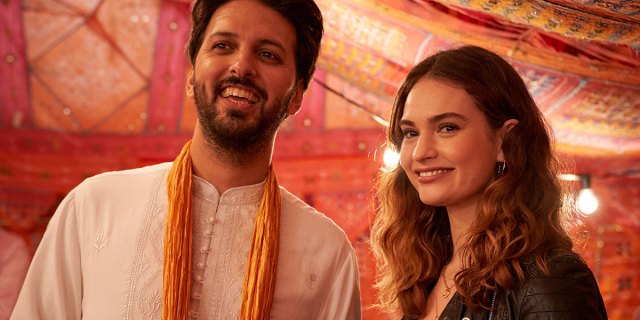‘What’s Love Got to Do With It?’ review: Lily James and Shazad Latif charm in Shekhar Kapur’s unique outlook on love [B-] | Toronto

Why do people get married? Does love have to play a role in marriage? Or is companionship more important? These are some of the questions that Shekhar Kapur’s new film What’s Love Got to Do With It? considers. The Indian filmmaker, known for Elizabeth and The Four Feathers, has returned with something outside of his usual wheel box: a romantic comedy/family drama that examines differing cultural views on marriage through a pair of best friends.
Zoe (the always charming Lily James) is an award-winning documentary filmmaker searching for her next subject, but discouraged by her producers’ reactions to the serious issues she hopes to take on. When her childhood neighbor Kazim (the heartthrob Shazad Latif) tells her that he has finally agreed to have an arranged marriage, inspiration strikes, and she asks if she can trace his journey. Zoe can’t understand Kazim’s willingness to have an “assisted marriage” despite her own lack of luck in love. Of course, because this is a rom-com, the pair will eventually realize that they may already have feelings closer to home.
What gives the film so much heart isn’t the romance but its depiction of family. Kazim is close with his parents, who are thrilled that he is finally settling down, but as the story unfolds, it becomes clear that their picture-perfect family is actually hiding secrets and regrets. Meanwhile, Zoe struggles with her zany mother Cath (Emma Thompson, clearly having so much fun) whose casual, though arguably unintended, racist comments and penchant for setting her daughter up on dates are enough to exhaust anyone. Thompson and James have excellent chemistry as mother and daughter, making it seem strange that it’s taken this long to have the pair in a film together.
Jemima Khan’s screenplay is clunky at times, especially in the wordplay around famous movies that Zoe’s producers delight in. (They suggest “Love Contractually” as a title for her documentary.) But the way that it explores different perspectives on marriage and love across British and Pakistani cultures makes it stand out amongst other films of its sort. While it clearly champions getting to make your own choices and find love, rather than just companionship, it’s also not disrespectful to those who do find happiness through more traditional means.
Zoe is an interesting lead character because of her resistance to and, at times, lack of belief in love. She’s a commitment-phobe who always chooses the wrong guys, something countless among us can surely relate to. Somehow this cynicism doesn’t make her cold or closed-off, as too many heroines of this type are; she still enjoys warm relationships with Kazim and her other best friend, whose two daughters she regales with bedtime stories. Her more modern, less whimsical versions of fairy tales tell the audience more about her own mishaps in love as she adapts each princess to her own life experiences. While Kazim struggles between the desire for true connection and family duty, Zoe simply wants to find “someone I could commit to watching a whole TV series with.”
The film has a sweet nod towards Rob Reiner and Nora Ephron’s classic romantic comedy, When Harry Met Sally, showing the interviews that Zoe has done with couples in Kazim’s family about their own relationships. There’s also perhaps a nod to You’ve Got Mail as Zoe lives on a houseboat (gorgeously decorated by production designer Simon Elliott).
But the film boasts something that no Ephron film ever did: an entire section set in Pakistan as Kazim, his family, and Zoe gear up for his big wedding day to the bride he barely knows. The film doesn’t delve as deep into what it means for Kazim to be Pakistani-British as it could have, but it does make an effort to represent both cultures. Nitin Sawhney’s score also blends Eastern and Western musical influences to create something reflective of both Pakistan and Britain.
What’s Love Got to Do With It? doesn’t totally reinvent the rom-com genre, nor does it boast the best romance that you’ve ever seen onscreen. But James and Latif have serviceable chemistry, and the film explores a topic rarely seen in light-hearted films of this sort. Kapur proves that he is adept at blending romantic comedy and family drama and creating something that highlights modern Pakistani-British culture.
Does the film actually answer the question, “What’s love got to do with it?” Maybe not. (It’s a strange choice of title.) Kapur’s answer is open-ended, but the film is a reminder of how sweet watching love blossom can be and how many paths there are to romance.
Grade: B-
This review is from the 2022 Toronto International Film Festival. There is no U.S. distribution at this time.
- ‘Argylle’ Review: Matthew Vaughn Hacks Up a Furball in Overcomplicated Spy Thriller - January 31, 2024
- ‘The Creator’ Review: Gareth Edwards Brings a Fresh Spin to What Could Have Been Stale Sci-Fi - September 26, 2023
- ‘A Haunting in Venice’ Review: Poirot’s Latest Case is a Ghostly Good Time - September 9, 2023

 Frontrunner Friday Oscar Predictions: The Pre-BAFTA Conclave Begins, Will a New Frontrunner Be Anointed? (2/20/26)
Frontrunner Friday Oscar Predictions: The Pre-BAFTA Conclave Begins, Will a New Frontrunner Be Anointed? (2/20/26)  ‘Paradise’ Season 2 Review: There Goes the Neighborhood [B-]
‘Paradise’ Season 2 Review: There Goes the Neighborhood [B-]  Director Watch Podcast Ep. 140 – ‘A Couch in New York’ (Chantal Akerman, 1996)
Director Watch Podcast Ep. 140 – ‘A Couch in New York’ (Chantal Akerman, 1996)  Interview: ‘Pillion’ Director Harry Lighton and Star Harry Melling Bring Kink to the Mainstream
Interview: ‘Pillion’ Director Harry Lighton and Star Harry Melling Bring Kink to the Mainstream